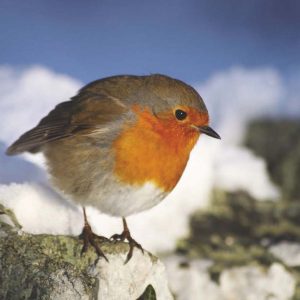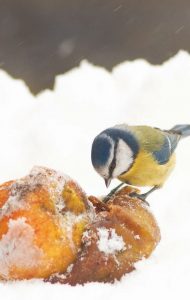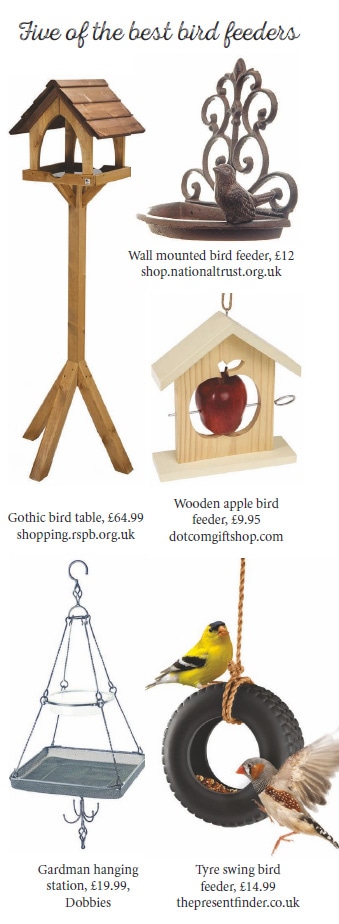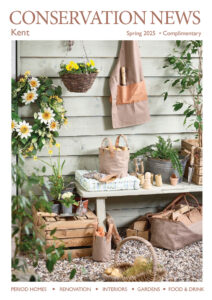Christmas dinner for the birds
As you sit down to your meal, plate piled high with festive goodies, have a thought for the wild birds around you. What will they be eating for their Christmas dinner?
 Winter is a difficult time of year for birds, the days are short and the nights are cold, so they must eat a lot of food in a short amount of time to have the energy to survive until the morning.
Winter is a difficult time of year for birds, the days are short and the nights are cold, so they must eat a lot of food in a short amount of time to have the energy to survive until the morning.
In addition, food is harder to come by in winter. Insects are hibernating, grubs are buried deep in the ground and snow and ice make it harder to find food.
Each bird has developed its own ways to make sure it finds enough to eat in the cold months.
Robins mainly feed on small invertebrates, which they find in the soil. They will hunt through the leaf litter and under bushes, where the ground is sheltered from frosts. Robins have proportionally very large eyes, which allows them to see well in these dark places.
It gives them another advantage, too – they can see in the half-light of dawn and dusk, so can start to hunt earlier and feed until later than other birds. In towns, robins will feed after dark in the artificial light.
Goldcrests, the UK’s smallest birds, need to feed constantly throughout the day to build up their energy stores for the night. They have learnt a sure-fire way of making sure they never have to
look too far to find food.
They feed on tiny insects and spiders that live on pine trees and spend most of their time in coniferous woodlands where they can easily flit from tree to tree, finding their ready-made lunches on the way.
Picky eaters?
 Whilst goldcrests survive by having one main source of food, other birds will eat a huge range of foods, increasing their likelihood of finding enough to eat every day. Blackbirds will eat worms, spiders, fruit and seeds. Herring gulls aren’t fussy either and will even pick through our dustbins to find a bite to eat.
Whilst goldcrests survive by having one main source of food, other birds will eat a huge range of foods, increasing their likelihood of finding enough to eat every day. Blackbirds will eat worms, spiders, fruit and seeds. Herring gulls aren’t fussy either and will even pick through our dustbins to find a bite to eat.
The master of restraint and forward planning is the mistle thrush. This is the UK’s largest thrush and in early autumn birds gather in large flocks to feed together. But as soon as holly berries appear, they will split off on their own or into pairs and get defensive. Each bird or pair will find itself a holly tree or bush teeming with berries and will set up a territory.
The berries on that tree won’t be eaten, but will be guarded with such care that no other birds can take them either. Mistle thrushes are so good at protecting their trees, just in case, that by spring many will still have their full crop of berries untouched, long after any unprotected holly has had its fruit stripped.
The Golden rules
- Don’t put out salty foods. Birds can’t digest salt and it will damage their nervous systems.
- Only leave enough that can be eaten in one day – otherwise you may attract unwanted visitors, such as mice and rats.
- Always follow sensible hygiene measures, including washing hands thoroughly after filling and washing feeders.
 Sharing your dinner
Sharing your dinner
Many of your kitchen scraps and leftovers make ideal snacks for birds. Here’s a quick guide to what you can put out:
FAT – fat from cuts of meat (as long as it comes from only unsalted varieties) can be put out in large pieces, from which birds such as tits can remove morsels. Make sure that these are well anchored to prevent large birds flying away with the whole piece.
ROAST POTATOES – cold and opened up, these will be eaten by most garden birds.
VEGETABLES – cold Brussels, parsnips or carrots will be eaten by starlings and other birds, but remember not to put out more than will be eaten in one day, otherwise you run the risk of
attracting rats.
FRUIT – excess or bruised apples, pears and other fruit are very popular with all thrushes, tits and starlings. Cut them up and leave them on the bird table or on the ground.
PASTRY – cooked or uncooked is excellent, especially if it has been made with real fats.
CHEESE – Hard bits of cheese are a favourite with robins, dunnocks, blackbirds and song thrushes. It will also help wrens if placed under hedgerows and other areas in your garden where you have noticed them feeding. Avoid very strong or blue cheeses.
DRIED FRUITS – raisins, sultanas and currants are particularly enjoyed by blackbirds, song thrushes and robins.
BISCUITS AND CAKE – Stale cake and broken pieces of biscuits from the bottom of the tin are high in fat and ideal for birds in the winter.
For more information, visit rspb.org.uk
Posted in: Features
